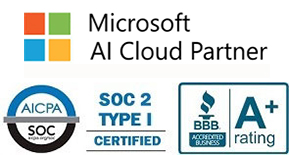
What is Cloud Migration?
Cloud migration, simply put, is the process of transferring your business or operation’s digital infrastructure from your platform into the cloud. This can be either a partial or complete transfer to the cloud, but in either case is done to help support your overall operations and protect important company data.
Cloud migration offers numerous benefits, both boosting your business security and saving you money that would otherwise go towards maintaining your data center. Cloud scalability is an essential part of this process, supporting your operations as they grow and shift during this migration.
What is Scalability?
So what is scalability exactly? Simply put, it refers to the capacity of an application or business to accommodate increased growth without ever compromising performance. Scalability works one of two ways— either vertically or horizontally. Vertical scalability involves adding resources to an individual component, while horizontal involves adding more instances.
Scalability offers a number of potential advantages for businesses, including:
- Handling large spikes in traffic
- Managing increased user activity
- Maintaining functionality
- Ensuring a great experience for every user
Top Benefits of Cloud Migration
One of the best ways to scale your business is to migrate your operations to the cloud. Here are some of the best benefits of cloud migration:
1. Increased Scalability and Flexibility
Scalability allows your business to scale your resources up or down as needed. Having this flexibility available helps to ensure that network resources are being used efficiently and that downtime is minimized.
2. Cost Efficiency
Cost efficiency is always a top priority for every business. Luckily cloud services operate on a pay-as-you-go model, which means that you avoid large upfront investments and high fees. This cost-effective approach means you’ll be able to allocate your resources more efficiently and invest capital in other strategic initiatives.
3. Improved Performance
Cloud providers offer a vast network of data centers equipped with cutting-edge hardware. This infrastructure provides many perks for businesses, including:
- Faster processing speeds
- Improved data retrieval
- Reduced latency
- Enhanced user experiences
- Improved operations
4. Disaster Recovery and Data Security
Another huge benefit of using the cloud is the security measures and backup solutions that come with it. In the cloud, data is stored multiple times across multiple locations, helping to greatly minimize the risk of valuable company data being permanently lost.
5. Automatic Software Updates
Cloud providers manage your software updates and patches rather than you having to worry about it yourself. With cloud migration, your business always has access to the latest security enhancements and bug fixes.
6. Environmental Impact
Cloud infrastructure can also have a positive environmental impact since it enables better resource consolidation. By optimizing energy consumption and reducing the carbon footprint compared to traditional on-premises data centers, your business will not only be greener but also save money.
7. Faster Time to Market
Many cloud-based services make it possible for your business to bring products to market faster than ever before. This is especially useful in new and developing industries, where this timeliness can provide a crucial edge over your competition.
8. Innovation and Experimentation
When your business is able to use the cloud, it’s also able to be more innovative and experimental. Thanks to the cloud, you can easily prototype and test new ideas without the need for extensive infrastructure (which can often be quite costly).
Essential Considerations of Cloud Migration
While cloud migration has a large number of benefits that it offers, there are several essential considerations that you need to take into account before doing it. Planning for cloud migration helps ensure a smooth transition for your business and ensures the infrastructure is designed to meet your needs.
Here are some important things that your business must consider first:
1. Scalability Planning
Before migrating, assess your scalability needs thoroughly. Consider how your business is likely to grow and how the cloud infrastructure can accommodate these changes.
2. Data Security and Compliance
Depending on your particular industry, there may be different security measures or compliance practices you’re required to follow, such as HIPAA. When you’re considering a particular cloud provider, be sure that they align with these so that important company or customer data is always protected.
3. Application Compatibility
If your current digital infrastructure isn’t compatible with the cloud, it may need modifications to work correctly. Assess your existing software and services to determine if any changes are needed before cloud migration.
4. Cost Management
While cloud services typically save your company money, it’s always just a good idea to keep an eye on expenses to prevent surprises. Develop a cost management plan that takes into account your business’s current needs before committing to any particular cloud provider.
5. Vendor Lock-In
Vendor lock-in occurs when your business becomes heavily or entirely reliant on a specific cloud provider’s services. This can be devastating if a provider goes out of business or has an outage, so it is always best practice to utilize multi-cloud or hybrid cloud solutions as opposed to a singular vendor.
6. Ongoing Employee Training
After your business migrates to the cloud, it will likely take a bit of time for employees to adjust to the new software and infrastructure. To help facilitate this change and ensure it goes smoothly, be sure to offer robust training and support from management to help everyone get comfortable.
Integrated Computer Services
Looking for IT services or assistance? At Integrated Computer Services, we’ve been in business for over two decades, helping busy professionals like yourself manage their digital infrastructure. We provide 24/7/365 managed IT services and utilize a multi-faceted approach to ensure you get the best cloud services possible, every time.
Want to learn more about what we do? Check out our blog for more information and helpful tips about managing your digital infrastructure. Or click here to Schedule An IT Assessment with us now!
About Us:
- 150+ 5-Star Google Rated IT Firm
- Microsoft Certified Cloud AI Partner
- SOC II Certified Managed Service Provider
- Better Business Bureau A+ Rated






